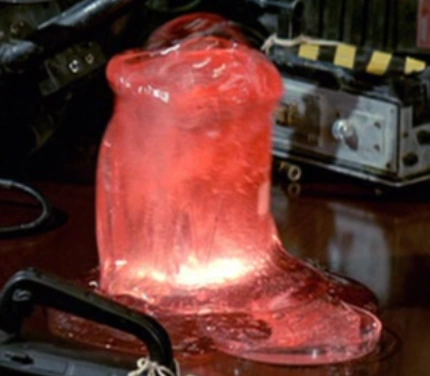There are some solid perks to having a nurse as a wife, like giving my monthly b12 shot without having to go to a doctor, access to an instant wealth of medical advice through text messages, or starting IV’s in the hospital when no one else can get them, but one of best advantages is being able to interact with some incredible doctors. While my surgeon is a genius and can remove stomachs with robotic precision; the sparse follow-up and the classic post-gastrectomy nutritional plan which can be summed up, “just eat more eggs”, is not going to cut it. This brings me to another huge lesson learned through this process: when it comes to your health, you need to be your own advocate. Perhaps it was naive for me to assume records, medical history and relevant paperwork would easily pass between doctors offices, that is not necessarily the case depending on your health care network. Being proactive about my own health by scheduling follow-up appointments, arriving fully prepared for consultations with medical histories and records has been the only way to ensure I am getting the most helpful information about my health.
 Last May I officiated a wedding for a couple in the medical profession. The bride, is a nurse who works with Kate and the groom, a primary care physician. The communication from Stanford and my primary care physician has been non-existent to the point she was surprised to hear about my history with CDH1, HDGC and my total-gastrectomy, so we thought it was time to make the call to the bullpen. After many consultations, nutritionists, gastroenterologists, dietitians and snake oil salesmen, we decided our best bet was to get into a network that communicates better with Stanford. Dr. Perkins, whose wedding I officiated, happens to be a primary care physician in a health group that works closer with Stanford. On our first visit, he was able to refer me to their bariatric community.
Last May I officiated a wedding for a couple in the medical profession. The bride, is a nurse who works with Kate and the groom, a primary care physician. The communication from Stanford and my primary care physician has been non-existent to the point she was surprised to hear about my history with CDH1, HDGC and my total-gastrectomy, so we thought it was time to make the call to the bullpen. After many consultations, nutritionists, gastroenterologists, dietitians and snake oil salesmen, we decided our best bet was to get into a network that communicates better with Stanford. Dr. Perkins, whose wedding I officiated, happens to be a primary care physician in a health group that works closer with Stanford. On our first visit, he was able to refer me to their bariatric community.
For the first ten minutes of my meeting, my nutritionist was very confused about why I was in the bariatrics department since my goal was not to lose weight. After explaining my family history, the past 12 months, and the struggles I have lately with dumping syndrome, again, she was surprised I did not have a team following up on my care. This is where I think the CDH1/HDGC community could learn from bariatics. While bariatrics studies the causes and treats obesity, in this network, a surgery involving a major life change like a gastric bypass requires at least six meetings with nutritionists, surgeons, dietitians and group counseling before surgery. After surgery, bariatric patients continue to meet with the surgeon at regular intervals to ensure proper healing, they maintain constant contact with nutritionists who keep regular tabs on blood work, and are encouraged to attend group counseling as a way to help people transition towards a new way of life. While I was able to find a group online to help me figure out what life would be like after a total gastrectomy, I think having a team of medical professionals following up with me for the first year after a life changing event like a total-gastrectomy would have been helpful. Up to this point, I have had to schedule my own follow up appointments with various specialists without a real plan. My gastroenterologist has concluded it is no longer necessary for me to see him because my surgeon knows my body best and in any event, all medical procedures involving my digestive tract moving forward would have to be referred to Stanford anyways. Up until now, Kate has been explaining the labs from my blood work and depending on the numbers, off to Whole Foods I go to pick up the necessary supplements. Not the best plan of attack, but this is what I had, until now.
In my 60 minutes with my nutritionist I learned about some various forms of vitamins that will have an easier time absorbing in my intestines:
D3 – as cholecalciferol
Folic acid
Iron – as ferrous fumarate
B12 – right now I’m getting shots of cynocobalamin, but my intestines might have an easier time of absorbing the other form methylcobalamin.
Vitamin K – this week I started eating spinach again with very little issue, so hopefully my issues with vitamin K and iron will work itself out.
She also told me that I should be paying attention to calcium and biotin which has a variety of jobs, but most relevant to me, it might help with the regulation of my blood sugar.
Switching from Gatorade to coconut water was a good decision, nutritionally.

The nutritionist also had a solid theory about the dumping syndrome I had been getting almost everyday a few weeks back. When she told me part of the issue was bread, I thought, “OF COURSE!”, but then she explained to me that gluten is not the problem. The bread, regardless of whether it is gluten-free or not, goes into my intestine, starts to soak up water and expand in my intestines which mimics what happens when I get dumping syndrome. I was advised to stay away from fluffy, spongy breads (gluten-free, whole grain, enriched or not). Any breads/grains that soak up water and expand in my intestines are now off the menu, which explains why I have been feeling better since switching to a lower carbohydrate diet. If you know me, you know my love for all forms of bread, especially the fluffy ones, but she did tell me the more toasted the bread, the less it will absorb water. If I have to get a sandwich fix, I should try an extra toasty panini instead. If I have to get a pizza fix, the crust should be as thin as possible. Crackers are perfectly fine as long as it does not absorb too much water and expand. This also explains why I cannot eat phở noodles anymore. If you have ever left your phở noodles in the broth for too long, you know that they expand… like universe. So the basic test from now on: if I place a piece of bread/noodle/grain in a bowl with water and it starts to soak up water morphing into the psychomagnotheric slime from Ghostbusters, I should probably stay away from it. So my new motto for life: stay toasty, my friends.

On the health front, I’m starting to get more exercise and I’m recovering a lot of my muscle mass. Thanks to a friend who has been lending my his mountain bike, I have rediscovered the sport after being 12 years away, a welcome change from miles on a road bike. My weight hovers between 158 and 162 lbs depending on calories in/out, which my nutritionist said was healthy weight for my height and age. My body fat percentage is 18% which is a little on the high side, but she thinks incorporating some strength training will help. My insomnia and bile reflux, however, are still a nagging issue, but are small in comparison to other issues I could be having. The portion sizes with my food have been consistent for the past few weeks and I’m learning how to regulate how much I eat in one sitting so I do not feel like I am going to explode. It has been a discipline to remember not to drink water with my meals, but overall, my diet feels almost normal. Apparently, 11 months post-gastrectomy, life can still be awesome.
Until my next post, stay toasty my friends!
-Steve


I second follow-up well care as a big problem post gastrectomy. It’s on my 2015 goals to get the right physician willing to help me actively manage my vitamins and overall nutrition. I’ve been on my own all of 2014. Great post again Steve!! And yes, you are always your own best advocate!
I love you Steven Dang!
Currenlty in middle earth…very tense here! Might have to evacuate today! Please pray!!!
Love you Sam! Good golly! Come home safe Sam! Prayers are with you!
Sent from my iPhone
>